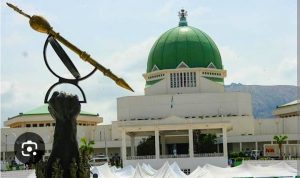


(C) Google.
The Senate on Tuesday approved President Bola Tinubu’s external borrowing plan of $21.5 billion for the 2025–2026 fiscal period, aimed at financing critical development projects across key sectors of the economy.
The approval followed the presentation of the report by the Chairman of the Senate Committee on Local and Foreign Debts, Sen. Aliyu Wamakko (APC–Sokoto), during plenary.
In addition to the $21.5 billion loan, the Senate also approved a ¥15 billion (Japanese Yen) loan and a €65 million grant.
Also endorsed was the issuance of a ₦757 billion Federal Government bond to clear outstanding accrued pension rights under the Contributory Pension Scheme (CPS) as of December 2023.
Furthermore, the Senate gave its nod to a request for capital raising of up to $2 billion through a foreign currency-denominated instrument in the domestic market.
According to Wamakko, the borrowing requests align with the provisions of the already-approved Medium Term Expenditure Framework (MTEF) and Fiscal Strategy Paper (FSP) for the 2025 budget.
“The items listed in the borrowing plan are consistent with the priorities of the MTEF and FSP,” he said, urging the chamber to support the president’s request.
Sen. Solomon Adeola (APC–Ogun), who seconded the motion, described the approval as largely procedural, noting that most of the items were embedded in the 2025 Appropriation Act.
“With this approval, all projected revenue sources, including loans, are now in place to fully fund the budget,” Adeola, who chairs the Senate Committee on Appropriations, said.
Supporting the motion, Sen. Sani Musa (APC–Niger) emphasized that the loan covers a six-year disbursement period, not just the 2025 fiscal year.
“No economy develops without borrowing. What we are doing is consistent with global best practices,” Musa said.
Sen. Adetokunbo Abiru (APC–Lagos) added that the loans comply with the Fiscal Responsibility Act and the Debt Management Act, stressing that they are intended for infrastructure and human development.
“These are long-term, concessional loans with favorable repayment terms, ranging from 20 to 35 years,” Abiru stated.
However, Sen. Abdul Ningi (PDP–Bauchi) expressed concerns over the lack of clarity in the committee’s documentation regarding the loan’s repayment structure and allocation.
“Our constituents need to know how much is being borrowed in their name and for what purpose,” Ningi argued, calling for more transparency in the disbursement and impact of the loans.
In contrast, Sen. Victor Umeh (LP–Anambra) praised the borrowing plan, particularly its inclusion of major investments in the eastern corridor.
“This is the first time I’ve seen $3 billion earmarked for the reconstruction of the eastern rail line. That alone justifies my full support,” Umeh said.
Presiding over the session, Deputy Senate President Jibrin Barau (APC–Kano) commended the committee’s thorough work and stressed the national spread of the projects.
“This shows that the Renewed Hope Agenda is truly inclusive. No region is left behind,” he said.
Barau also emphasized that all disbursed funds must be utilized strictly for capital and development projects in line with relevant public finance laws.
— NAN
Edited by Dada Ahmed.


